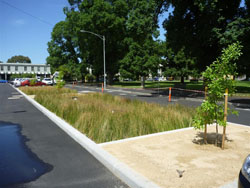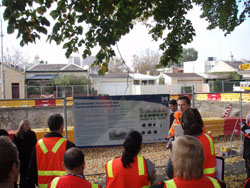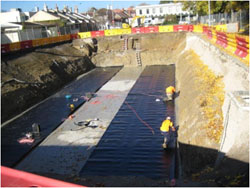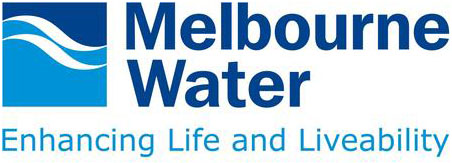resource library
Array
Biofilter median strip on Darling Street

Site visit during construction

Underground storage tank during construction
Darling Street Stormwater Harvesting Project
City of Melbourne
Darling Street, East Melbourne | Map:
Published: 03 May 2012
Project Overview
The Darling Street Stormwater Harvesting project in East Melbourne is an innovative stormwater harvesting project that provides treated stormwater to irrigate neighbouring parks and tree medians, including Darling Square, Powlett Reserve and medians in Grey, Simpson, Powlett and Albert streets.
The project took advantage of a local streetscape upgrade - including replacement of poor performing golden elms, modification of tree islands and resurfacing of roadway - to trial a new stormwater harvesting technology that requires infrastructure to be installed below ground.
The project harvests stormwater from two nearby existing drains. After diversion from the drains, the stormwater flows through a Gross Pollutant Trap (GPT) and a sedimentation chamber before being stored in underground tanks. Pumps can then be used to convey the collected stormwater into the above-ground biofiltration systems for treatment. The treated stormwater is finally stored in a holding tank ready for irrigation use.
This project is an initiative derived from City of Melbourne's 'Total Watermark - City as Catchment' strategy and addresses three of its main targets: water demand reduction, use of alternative water sources and stormwater quality improvement. It also provides a range of social, environmental and economical benefits.
Drivers and Objectives
Darling Street is the pilot project for the City of Melbourne's long term stormwater harvesting strategy, which aims to annually implement 1-2 systems on various sites within the municipality. The project took advantage of a local streetscape upgrade to trial a new stormwater harvesting technology that requires infrastructure to be installed below ground.
The main objective of this project was to reduce potable water demand by providing an alternative water supply source for irrigation of local parks and tree medians. The harvesting capacity of the system was therefore sized to meet irrigation demand for the nominated streets and reserves within the precinct.
Other objectives included:
- keeping costs and spatial footprint of the system as low as possible
- achieving environmental benefits through the reduction of runoff volumes entering downstream water bodies
- delivering an enhanced public realm for the community.
Organisations
Design Team
Concept development - City of Melbourne, Cardno (Civil) & LIS (Landscape)
Detailed Design - Citywide/Cardno with City of Melbourne
Funding Partners
City of Melbourne
Melbourne Water - Living Rivers
The Victorian Government through the Stormwater and Urban Recycling Fund
Design, construct & operations contractor - Citywide
System design and head contractor - Biofilta Stormwater Solutions
Water quality monitoring and assessment - CAPIM (University of Melbourne)
Principle sub-contractor - Multipro Civil
Project Outcomes
The Darling Street stormwater harvesting project provides a range of benefits:
Environmental: Meets best practice for stormwater pollutant reduction and also reduces stormwater runoff volumes into the local waterways. In addition, use of the treated stormwater for irrigation reduces pressure on potable water supply.
Economical: Introduces an economically viable alternative water source as the cost of Melbourne's potable water supply begins to rise. The project cost is 75% cheaper than traditional WSUD projects for a comparable volume of stormwater treatment. The saving is mainly achieved by the combined use of raingarden and underground storage tanks, which:
(i) minimise the spatial footprint of the project compared to a traditional above-ground raingarden alone
(ii) reduce the maintenance requirements of the system.
The system is mainly cleaned with a vacuum truck removing sediment from the GPT and the sediment chamber. Whilst removal of wind blown rubbish and hand weeding will still be necessary in the raingarden beds, the maintenance is a lot less labour intensive.
Social: The project provides increased landscape amenity and mitigation of the urban heat island effect. A community engagement strategy was put in place to seek internal and key external support early on in the project development. It allowed project details to be communicated widely to the local residents, creating greater community awareness of water sensitive urban design.
Lessons Learnt
Key lessons learnt from this project were largely focused around the construction, implementation and maintenance phases. These include:
- Involving Council's engineering and parks departments during the design process ensured asset management and design issues were in line with Council's existing maintenance practices.
- When placing infrastructure under ground it is important to obtain good services and geotechnical information including groundwater condition during the design phase.
- To ensure smooth operations of construction works, it was necessary to know site specific constraints and in particular material allowances including cut, fill and disposal.
- Minimising the chain of command for site direction during construction works was shown to improve communication.
- Using new technologies introduces new maintenance requirements. Appropriate maintenance personnel and training needs to be organised early on to ensure timely provision of training.
- As the project adopted an innovative approach and new technology to managing, treating and re-using stormwater in a developed urban setting, there was a lot of external and internal interest. This resulted in numerous requests to host informal site tours and has stimulated knowledge sharing with peers.
Project Cost
Total cost - $1,737,000 (including $100,000 for a 2 year monitoring program), with funding from:
- Melbourne Water - Living Rivers: $200,000
- Victorian Government - Stormwater and Urban Recycling Funding: $291,000
Timeframe
2009 - 2011
Contact
Ralf Pfleiderer - City of Melbourne: ralf.pfleiderer@melbourne.vic.gov.au
